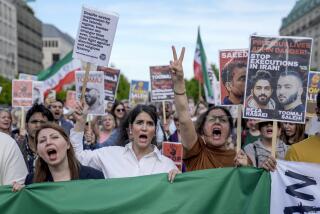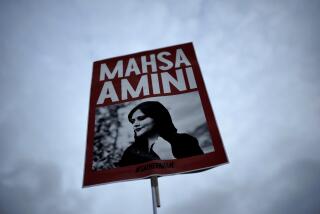Opposition leader Mousavi denounces Iranâs crackdown
Reporting from Beirut â Defiant amid demands for his execution, Iranâs leading opposition figure on Friday issued a scathing denunciation of the governmentâs violent crackdown against his supporters, calling for a restoration of civil liberties to end what he called a âserious crisisâ that has destabilized the nation.
Mir-Hossein Mousaviâs statement, posted to reformist websites, was his first public comments since a violent weekend of protests coinciding with an important religious holiday. Mousaviâs 43-year-old nephew, Ali Habibi-Mousavi, was shot to death Sunday.
Mousavi said threats against his life would not deter him.
âIâm not afraid of being one of the postelection martyrs who lost their lives in their struggle for their rightful demands,â he wrote in his first major public statement in weeks. âMy blood is not redder than that of other martyrs.â
Mousavi ran for president in disputed June elections in which President Mahmoud Ahmadinejad was declared the victor, triggering months of on-and-off protests.
Authorities describe the unrest as a foreign-backed plot meant to weaken the Islamic Republic, which is under international pressure for its drive to master nuclear technology. Opposition news websites report that security forces have arrested at least 1,300 people in Tehran and other cities since the Dec. 19 death of dissident cleric Ayatollah Hossein Ali Montazeri sparked a fresh wave of demonstrations.
Plainclothes security officials and Basiji militiamen have stormed the homes and offices of dissident clerics and activists. Hard-line clerics loyal to supreme leader Ayatollah Ali Khamenei have labeled the protesters and opposition leaders mohareb, or enemies of God, an Islamic offense punishable by death.
âThese people are flagrant examples of corruption on Earth, and we punished the likes of them in the early days of the revolution,â Ayatollah Ahmad Jannati told worshipers at Friday prayers, possibly referring to the mass execution of the Islamic Republicâs jailed opponents during the 1980s.
âSecurity and intelligence bodies should accomplish their tasks to arrest norm-breakers quickly for trial,â said Jannati, who heads the Guardian Council, the powerful committee of clerics and jurists that ratified Ahmadinejadâs reelection last year. âWe need revolutionary judges and not the indolent ones.â
Opposition websites also published a photograph of a Chinese armored anti-riot vehicle equipped with high-powered water cannons that has reportedly arrived in Tehran for possible use against demonstrators.
The constant stream of threats has failed to silence an opposition that has become increasingly daring. Some took to the streets Thursday in wildcat demonstrations around the capital and were met with volleys of tear gas.
Shocked by the sharp escalation in rhetoric and tactics on both sides, some conservatives within the establishment have begun agitating for compromise. In response to Mousaviâs letter, former Revolutionary Guard commander Mohsen Rezai urged Khamenei to reach out to the opposition. Rezai noted that Mousavi refrained from describing Ahmadinejadâs government as illegitimate.
âMr. Mousaviâs retreat from denying the government of Mr. Ahmadinejad and his constructive proposal to the parliament and judiciary . . . can be regarded as a beginning of a unity-fostering move from the frontline of the protesters,â he said, according to the news website Tabnak.
Rezaiâs comments suggest the depth of anxiety among some Islamic Republic stalwarts about the countryâs future.
Mousaviâs statement fell short of the radical demands being made by an increasingly vocal segment of the protest movement.
He reiterated long-standing reformist calls for a more transparent and accountable government, new election rules, the release of political prisoners, the lifting of media restrictions and a recognition of peopleâs right to protest and form political parties.
But he also stood by the protesters, refusing to condemn any of their actions, as demanded by hard-liners. He predicted that the governmentâs use of political violence and mass arrests would not pull Iran out of its political crisis.
âLetâs assume that you impose silence by arrests, acts of violence, threats and muzzling newspapers and news websites,â he wrote. âWhat solution do you have for the change in peopleâs view of the regime? How can you make up for the lack of legitimacy?â
He denied that he or other reformist leaders had called people to the street.
âGod-seeking people thronged the streets to prove that extensive self-motivated social and civil networks, springing up before and after the election, do not wait for statements and declarations,â he said.
More to Read
Sign up for Essential California
The most important California stories and recommendations in your inbox every morning.
You may occasionally receive promotional content from the Los Angeles Times.










